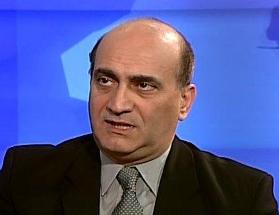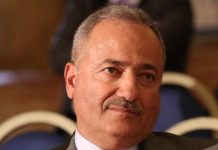RT Interview with Dr. Walid Pharis/Pending question: ‘What’s after ISIS is weakened?’
Published time: October 06, 2014 12:49
http://rt.com/op-edge/193516-western-coalition-isis-strategy-prospectives/
The US and its allies have little choice but try to weaken ISIS, though their strategy is unclear as they have no idea who will take IS positions both in Iraq and Syria after the goal is achieved, counter-terrorism expert and advisor Walid Phares told RT.
RT: This weekend ISIS issued a video of another beheading, this time British hostage Henning. What’s the purpose of these videos showing the violent killing of innocent people?
Walid Phares: ISIS is a terrorist organization and at the same time they want to send more messages to the international community to intimidate the leaders of the international community because they know that a wide coalition is forming against them, many members of this coalition are from the West, but you also have forces on the ground against them. So one of the weapons that ISIS is using is propaganda, is sending these awful images and videos of beheading of individual innocent people so that they hope the public will rise against intervention in Syria and Iraq.
RT: The US Vice President Joe Biden made a statement blaming US allies in the Middle East for funding and supporting ISIS. Why has Biden come out with this allegation only now?
WP: Actually, this is only an allegation as you said, but it has to have an explanation. It is not that US allies or other than allies have actually created ISIS. What they have done is to fund individuals or networks of jihadists when these jihadists were rising in Syria against the Assad regime, and those allies have sent those weapons to rebels thinking that the rebels are going to be establishing a new democratic Syria. But many of these rebels were actually jihadists. Later on, these rebels-jihadists joined Al-Nusra, which was Al-Qaeda, and after that they joined from Al-Nusra ISIS. So there is some sort of responsibility that all countries involved in funding or sending support to jihadists will have to bear. But that’s a lesson for the future because now the US and its allies are gathering a very large coalition that includes countries that in the past may have either sent some sort of aid or allowed those jihadists to cross their territories, and namely Qatar and Turkey, but now Qatar and Turkey are joining the coalition.
RT: How effective could a US campaign be against ISIS? Could the coalition be discouraged by the threats and video issued by IS?
WP: Certainly, ISIS and jihadists are trying to push Western powers away by perpetrating these beheadings in public or at least airing these videos of this act of barbarism. At the same time the US and its allies have little choice but try to weaken ISIS. However, in the cycle of escalation it is going to be dependent on who is going to take the initiative on the ground, meaning from the air you can pound them, you can bomb them for a long period of time, you could take out the heavy equipment and material, but you cannot occupy, you cannot take over the positions of ISIS. So the challenge now is going to be both in Iraq and in Syria. If ISIS is weakened despite its propaganda – at one point it will be weakened – who is going on the ground to move forward and occupy their position? It might be moderate Syrian opposition who is so strong, or the Assad regime forces in Syria. And in Iraq, is it going to be the Iraqi army, which has a problem in the Sunni areas? Or it is going to be the Kurds who can defend their areas but cannot go into the Sunni areas? Most of the campaign against ISIS is not clear yet at this point of time.
RT: The Vice President also said Syria has no moderate opposition, yet the White House intends to arm rebel groups. Which ones, in that case?
WP: What the Vice President may be saying, and I’m not defending what he is saying, that so far Syrian opposition, most of its armed forces cannot be coined as the moderates we want to see. That’s what he is trying to say, while the policy in the White House is “We will be looking to find those moderates to organize them, to arm and train them and place them back in the battlefield.” Again, from both the Vice President and the President you would feel that this partner that we want to see in Syria taking action against ISIS is not ready yet. Should it be present or present in the future, it’s to be seen.
RT: Barack Obama has admitted that the intelligence community failed to identify the threat posed by Islamic State early enough. How did that happen?
WP: There are many members in Congress who disagree with the President’s statements, and we have seen many voices in Washington saying that Congress received copies of the intelligence assessment e last year and at least early 2014. And in those assessments obviously the so-called ISIS, in Arabic Daesh, or IS now, has been described as a “mounting threat”. The problem, in my view, has not been the intelligence community assessment. Any intelligence agency in the world, including in the Arab world, probably in Russia as well and elsewhere, they knew that ISIS was around. The problem has been at the political level. It’s not knowing what it is; it’s what to do about it. The lack of action against ISIS in the early part of the 2014 or late part of 2013 is responsible for the fact that ISIS overnight in June and in July took over large parts of Iraq and significant parts of Syria.
RT: Turkey and the Gulf States are part of the anti-Islamic State coalition. Can we be sure they won’t try to hijack the campaign to get rid of Assad?
WP: That’s a very good question. Let’s break it down into multiple parts. The Saudi main concern now is to contain ISIS. Qatar, which has been seen as a dynamic actor in support of the Islamists and jihadists in Syria, Iraq and North Africa, is trying to change its posture. The main role is really for Turkey. The AKP government in the past has also allowed some of these jihadists to move to Syria, so now they have to change their policy significantly. But yes, probably these countries would like to see an element in Syria that could be allied to them; probably they would like to see the FSA take over. So most likely they are trying to negotiate and position themselves in this campaign against ISIS as a way to weaken Assad.
But the US knows that, and Washington would like now to focus only on ISIS because the administration still believes that a political solution is the right way to go for Syria, meaning once ISIS is taken out, then the Syrian opposition and the Assad regime in Geneva will have to find the solution. But again, this is wishful thinking, these are political decisions. What will happen in reality on the ground? If ISIS is weakened, you are going to have a very ferocious race between the Syrian opposition and the Assad regime. We don’t know who will be the winner.
The statements, views and opinions expressed in this column are solely those of the author and do not necessarily represent those of RT.























